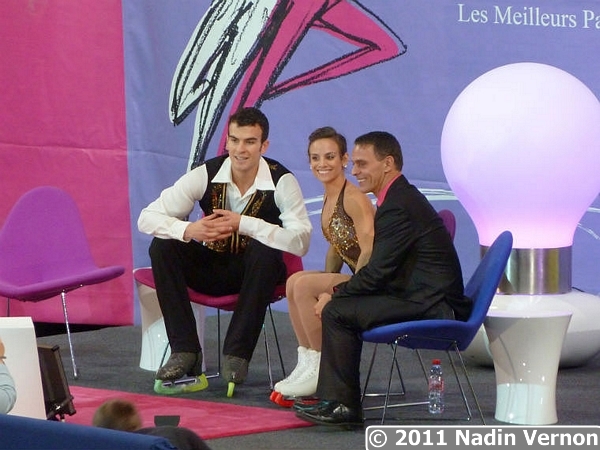Meagan Duhamel and Eric Radford: "We both have a very good balance with our skating and our lives"  
November 23, 2011
By Nadin Vernon
Photo © Eva
Maria Jangbro (EMJO)
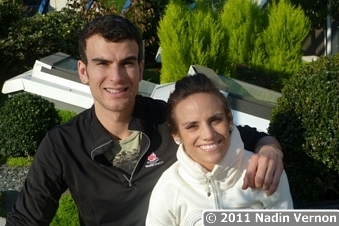 Meagan
Duhamel and Eric Radford (CAN) took the bronze medal at the Trophée Eric
Bompard, having placed second after the short program. They now have an
anxious wait, as the Rostelecom Cup will determine if they are able to qualify
for the Grand Prix Final, which takes places in Quebec this year - two hours
from where Meagan and Eric live. I caught up with them on a sunny Sunday
morning in Paris.
Meagan
Duhamel and Eric Radford (CAN) took the bronze medal at the Trophée Eric
Bompard, having placed second after the short program. They now have an
anxious wait, as the Rostelecom Cup will determine if they are able to qualify
for the Grand Prix Final, which takes places in Quebec this year - two hours
from where Meagan and Eric live. I caught up with them on a sunny Sunday
morning in Paris.
Congratulations on your bronze medal here, how do you feel the competition
went for you overall?
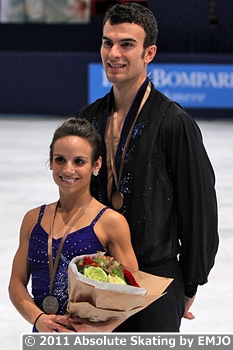 Meagan:
We're really happy with the short, we skated that very well. We can
do the long a lot better than that. We made completely different mistakes
than we did at Skate Canada. We fixed what happened there but then different
stuff happened here. But we know we can skate that program much better and
we're looking forward to doing that the next time because those were
some unfortunate silly mistakes.
Meagan:
We're really happy with the short, we skated that very well. We can
do the long a lot better than that. We made completely different mistakes
than we did at Skate Canada. We fixed what happened there but then different
stuff happened here. But we know we can skate that program much better and
we're looking forward to doing that the next time because those were
some unfortunate silly mistakes.
Eric: Everything was great in the warm-up and then on that first
opening jump, we did the Lutz and then we did the toe and then we probably
should have just ended it there. But when we're training we always want
to maximise our points, so we both went for that.
Meagan: We know that the last double toe is an extra point and if
we would have lost something by one point we would have regretted it.
Eric: It's funny, by not doing that toe we would have gained
two extra points. Actually almost four, because we wouldn't have had
the downgrades. That's one of those unfortunate blunders, that you just
can't really control. And then the throw.
Meagan: It's the first time we've ever missed a throw in
competition and I ever fell on that. And it looked ok in the air.
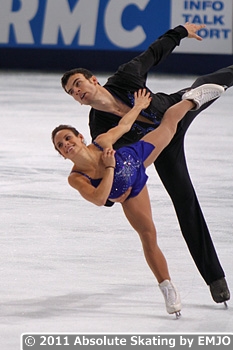 Did
you watch your programs again other than in the replay?
Did
you watch your programs again other than in the replay?
Meagan: Yes, we watched them on youtube.
Eric: We sort of laughed, because my double toe looks kinda silly
(laughs all round) and we had that little collision in the middle
of the program.
Meagan: Which was kind of funny
I bet that never happens...
Meagan: Oh it never happens (laughs). I don't think we
really felt comfortable in that program. At Skate Canada we were really
comfortable and we were really into the choreography and this time it wasn't
so much like that. So I think when we're more comfortable we'll
have less little errors.
Was it difficult to go out straight after Vera and Yuri? You were probably
able to tell from the atmosphere that they had a very good skate.
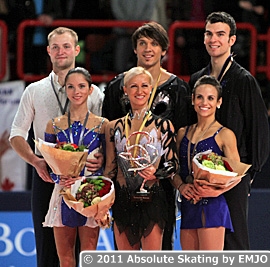 Meagan:
Not necessarily the skate but hearing their score. We never scored
125, so we stepped on the ice and coming second became out of the picture.
So even though we didn't watch their skate, we knew that they must have
had an amazing skate.
Meagan:
Not necessarily the skate but hearing their score. We never scored
125, so we stepped on the ice and coming second became out of the picture.
So even though we didn't watch their skate, we knew that they must have
had an amazing skate.
Eric: Yes, when we heard 125 we thought ok, probably that isn't
going to happen, because we've never done it before.
Meagan: It's possible, but we don't have that in our pocket
at the moment. We came in here and we knew all the maths, we knew if we
came second we would make the final or if we come third and score a certain
number, we would most likely have a chance to make the final.
Are you where you want to be at this stage of the season?
Eric: We did a couple of smaller competitions before these two and
we've done clean shorts now, so I think we got the short under control.
The long program, I think we've made a huge variety of mistakes in all
the competitions.
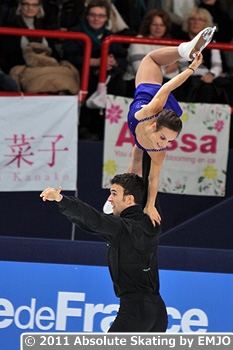 Meagan:
Yes, every competition we're making different mistakes.
Meagan:
Yes, every competition we're making different mistakes.
Eric: So I think we're slowly getting them out of our system
and it was the same for us last season actually. We didn't really start
to build our peak until Nationals which is January, so I think that despite
the mistakes here we're still feeling confident because we know that
this is still near the beginning. Of course we want to skate clean, but
the fact that we didn't, gives us room to grow and it lets us learn
what we need to concentrate on when we go back out there, so in the end
we are probably going to take away a lot more from the way we skated here
than if we came here and had a perfect program. We'd rather make the
mistakes at this competition, and learn from them, so that we can have great
skates when it really counts.
Meagan: But we're really happy because we're seeing an improvement.
We got a +3 from one judge on our triple twist, we got +2s on all our lifts,
we got all our levels, our side-by-side spin has been one of our highlights
in our program with the Level 4 and plus 2s, and our component score in
the long program has been the highest we've had. And we could skate
the program so much better than we did yesterday so we know we're going
in the right direction.
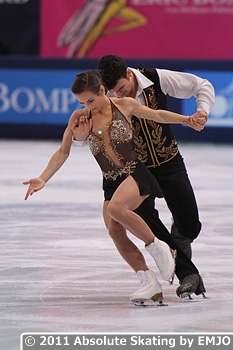 How
do you go about finding music to skate to and who's involved in that
process?
How
do you go about finding music to skate to and who's involved in that
process?
Eric: Throughout the year I'm always keeping an ear out for
music and usually what happens is I put a CD together with a bunch of different
types of music and this season it kind of happened that our choreographer
came to us with this music for the short, and we really liked the idea of
having the Flamenco character. If you skate to a slow piece of music, unless
it's Romeo & Juliet, where everybody knows the story, it's hard
to portray a story, whereas with a Flamenco piece of music there's a
character right from the beginning and a specific style that you can work
with. So I think that's what we really wanted to go for. We wanted to
have a short program with a good sense of style and character and we know
that Aranjuez is a very common piece of music but we really liked
this version. We know that Michelle Kwan used it...
Meagan: ...but we're not aware of any Pairs team that has used
it, so as common as it is, it's not common in Pairs skating. And our
choreographer did a really good job with creating the program.
Eric: I spent a lot of time trying to find long program music and
I brought in idea after idea and it wasn't the right music and I think
I was just randomly listening to music on youtube and I heard the Yellow
part and it's sweeping and melodic and then it's relatable because
people know Coldplay and it's powerful, and so I brought this in and
said, Can we please skate to this? And then the Viva la Vida part
came later. It's music that we really like and can relate to and I think
it fills an arena.
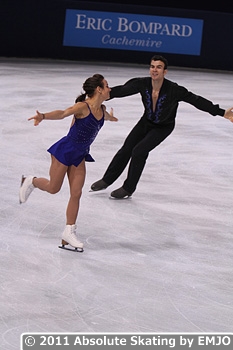 Meagan:
And we really felt that at Skate Canada, as soon as the music came in, the
crowd was so into it and that's what we wanted. It's relatable and
people can feel it. The judges came up to us after Skate Canada and said,
'We can really feel that program and you guys feel it and in turn we
feel it and you're really connecting us and it's an amazing piece'.
So it's good.
Meagan:
And we really felt that at Skate Canada, as soon as the music came in, the
crowd was so into it and that's what we wanted. It's relatable and
people can feel it. The judges came up to us after Skate Canada and said,
'We can really feel that program and you guys feel it and in turn we
feel it and you're really connecting us and it's an amazing piece'.
So it's good.
Eric: And I think that once we have that really good clean skate
it's all going to come together in the long program. For example when
we missed the loop in the long program, there is a big choreography section
that we left out, so when you make mistakes you lose something, it's
hard to keep the flow of the program.
Is it quite easy for you both to agree on a piece of music?
Meagan: We both agree on everything pretty much.
Eric: Yes, we're both quite flexible.
Meagan: I guess we both like the same type of building long program.
I think that our music last year and music this year is really grand, standing
ovation type music and we both like that and it's easy to skate to that
for us, so we enjoy it.
This is your second season together. How did you adjust to each other
when you first got together?
Eric: I think because Meagan and I were such strong single skaters,
it was really quite natural.
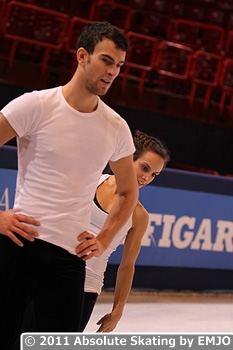 Meagan:
We just adapted so easily to each other.
Meagan:
We just adapted so easily to each other.
Eric: Yes, I mean we both had partners before where some things
would work easily and then there were others things that were always a struggle
from day one and they just never got to that point where they were just
natural. But for us pretty much from day one everything was pretty natural.
We never really struggled technically with anything, and I think the biggest
factor in that is that we're both strong single skaters and we're
both very adaptable. In the lifts, if something's a little off and she's
a little off, I can control it. Or in the throws, if I'm a little off,
Meagan's really good at pulling it back together. So as a team we have
a lot of leeway together, it's not like we're going in and it has
to be absolutely perfect for everything to work, it's really comfortable.
So does it feel like you've been skating together all along?
Meagan: Pretty much.
Eric: Yes, I think we still have a lot of building to do like matching
our styles even more and connecting a bit more and building that unison
of a team that's been together a longer time. But both technically and
artistically, we're always trying to take that next step and I think
what we're realising is, there's no big leaps. You can't just
jump five steps ahead. We're taking little steps but what's important
is that we're noticing each competition we are improving and other people
are noticing it too so it's not like we're doing all this hard work
for nothing.
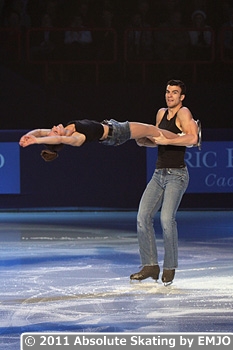 What
are you looking to achieve this season?
What
are you looking to achieve this season?
Meagan: Well I think at the beginning we were so eager because we
knew what we could attain, like what was possible for us. So when we first
started out we had a little bit of a hard time because we had really high
expectations right away. We went to our first ever International last year
and wanted to win it. So it took us a while to settle in to our expectations
and slowly everything is building up, and this year we sat down and we made
our goals and our goals were to have more intricate, more difficult choreography,
be more consistent, make the GP Final, make the National title and improve
our ranking at the World Championships. And I think that even if at this
competition and at Skate Canada, we didn't skate as perfectly as maybe
we would have hoped to skate, we're still step by step achieving our
goals. And we came here knowing what we needed to do to have a chance at
the final, and it might not have been easy and we might not have been perfect,
but we put ourselves in the position to achieve our goal. And then after
this season is done, we'll sit down and we'll decide how to approach
next season, especially with Worlds in Canada and take it step by step every
time.
We've seen quad twists and triple Axels this season, what are your
goals when it comes to technical content?
Meagan: We are the only team doing a triple Lutz right now so I
think that's how we push our boundaries technically.
Eric: I think we're always going to be pushing ourselves, getting
levels on the twist, coming up with new intricate lifts, and there are so
many different things you can do for entrances and exits of pretty much
all the elements, so I think that's where a lot of the pushing the technical
boundary comes from.
Meagan: And we're capable of doing all the triples side by side
so we have a wide range of which ones to choose to do. We're very luck
in that aspect, that we have that in our hat. And we can do all the throws,
so we're not limited. Right now, we're doing the Triple sal in the
short, but ideally we want to do the triple Lutz in the short. We just have
so much difficulty in our short program right now, that our main priority
was to skate a clean short program and it's a lot less stress to do
the sal. But as the season progresses, it's our goal to put the Lutz
into our short as that's going to be an extra two points. It's worth
it.
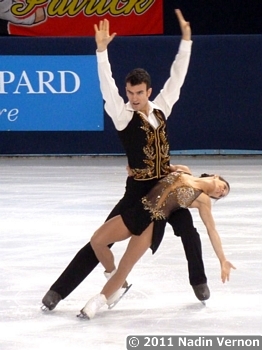
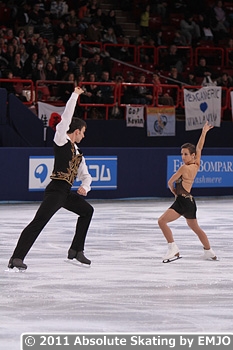
Can you talk me through your weekly schedule?
Eric: I usually wake up around 6:30. We're on the ice at 8,
so we usually do about three one hour sessions in the morning, and then
twice a week we do another hour with our choreographer at a different rink.
And then twice a week we work with a personal trainer and I do coaching
as well, three times a week. I coach kids from ages of about 4 to 14 and
then we have our weekends off to just kind of relax and get away from skating.
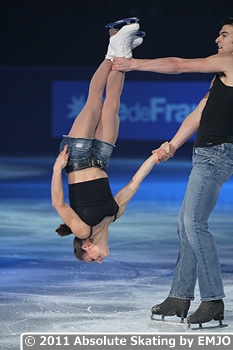 Meagan:
Erik coaches and I study, so that's where our schedules vary. I do Yoga
and Pilates for off-ice as well as working with the personal trainer. Studying
is through correspondence, so on weekends during my free time. I'm studying
Holistic Health and I'll be a registered holistic nutritionist in May
and then I'd like to go into personal training and Yoga instructing
and I'm looking forward to starting that next summer. I'm actually
a vegan, so that's what got me interested in holistic health. I've
started to invest in naturopathic therapies and I just find it very interesting,
this very pure organic type of lifestyle.
Meagan:
Erik coaches and I study, so that's where our schedules vary. I do Yoga
and Pilates for off-ice as well as working with the personal trainer. Studying
is through correspondence, so on weekends during my free time. I'm studying
Holistic Health and I'll be a registered holistic nutritionist in May
and then I'd like to go into personal training and Yoga instructing
and I'm looking forward to starting that next summer. I'm actually
a vegan, so that's what got me interested in holistic health. I've
started to invest in naturopathic therapies and I just find it very interesting,
this very pure organic type of lifestyle.
So you're already thinking ahead about what may come after skating?
Meagan: Well, you have that balance in your life. I think that's
the most important thing, if our lives were one dimensional it would be
very difficult. I'm going to be 25 soon and Eric's 26, and you need
to have balance in your life. That's the only way we're going to
enjoy what we're doing.
Does that also mean time off each other? Obviously you spend so much
time together on the ice.
Eric: Yeah, we both have our separate lives and I think that's
another thing about me and Meagan's relationship on the ice. We work
really hard when we're at the rink but it never feels like work. We're
always laughing and having fun but we work really hard and when we're
away from skating, it's...
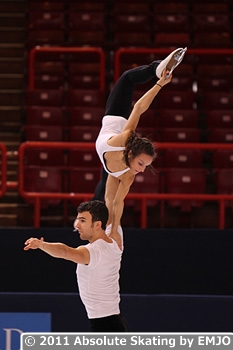 Meagan:
...life! (laughs)
Meagan:
...life! (laughs)
Eric: Yes, everything is left at the rink. I think we both have
a very good balance with our skating and our lives and that kind of balances
between us on the ice somehow. It's very good.
To come back to training again for a moment, do you do run throughs
every day?
Meagan: Yes, we alternate every day. On a Monday morning we'll
do the long program and Tuesday we'll do a short and we'll alternate
back and forth. But if on Monday we're doing our long program, we'll
do our short in parts. We used to do a full short and a long every day but
I think that Eric and I have realized that for us it's best to give
110% to one program instead of maybe doing a long program and saving some
energy because we still have to do a short later. And in competition, you
don't do both programs in one day.
Eric: Yeah, it's a little more quality over quantity.
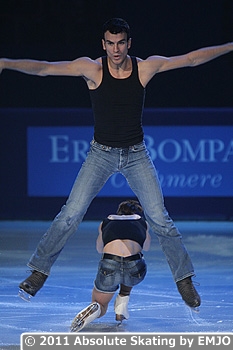 Will
you be doing any shows at all?
Will
you be doing any shows at all?
Meagan: We love to do shows, so anybody reading this, please invite
us to a show (laughs). We have a lot of show tricks and show moves,
we love it.
Eric: We're doing a show in Meagan's home town in December
and then we'll be doing the Christmas Show in Courchevel.
Meagan: Yes, they've invited us to come and we're really
excited about that. I've done the show there before but it will be Eric's
first time in Courchevel, I've told him all about it (laughs).
The balance that Eric and Meagan are talking about here is something
that doesn't just come across on the ice, but I also noticed it during
the press conference where both answered questions in equal measures which
doesn't actually happen that often. And again during our interview,
Meagan and Eric were finishing off each other's sentences and really
illustrated this balance, equal involvement and healthy relationship. I
wish them all the best for this season.
